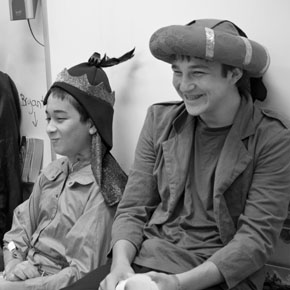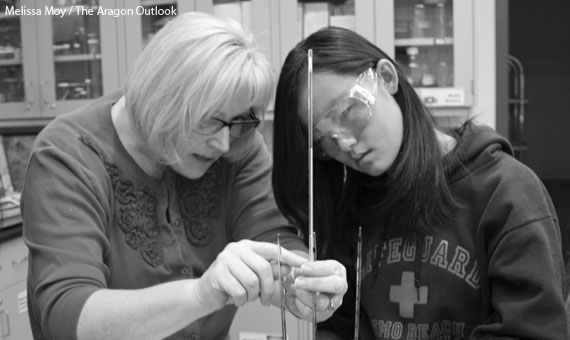
“There was the time when we were doing Rube Goldberg machines and someone asked if they could put fire in theirs,” says science teacher Kevin Doyle. “It looked like we could make it safe. What they said they were going to do and what they did were not quite the same thing, and we found out that fire blankets actually do work for putting out fires.”
While not everyone has set fire to their assignment, the students and staff at Aragon have had numerous experiences with class projects. From making new friends to putting out fires during a science experiment, everyone has negative and positive class project experiences.
At a surface level, class projects simply bring a different kind of experience to the classroom. The PNP game, short for Power and Pride, is a favorite among many Aragon students. The game consists of teams of students who earn points by expressing patriotism for their made up countries and battling other nations.
“It was very fun to make a ton of propaganda and support my country,” says senior Derrick Leong. Although PNP is really a week-long simulation of World War I, some argue that textbook reading would be sufficient to teach the concepts.
Doyle believes both styles of teaching have their merits. “Sitting in a desk and listening has its advantages in terms of how fast you can get information out, but it doesn’t necessarily sink in. I think class projects are a good way to get more of that going on.”
Teachers also appreciate the change in classroom routine. English teacher James Daniel says, “I really like the speech unit that we do; it’s fun to see the kids get up there. Its all these different topics, and sometimes they’re funny and sometimes they’re sad. I really enjoy that.”
Class projects tend to allow more diverse work opportunities and leave room for creativity and ingenuity.
Daniel says, “There was a project where [students] were supposed to take some line from Othello and they could do a poem or a rap song, or something. Most kids take a song, like a rap song, and use something like that. This kid, who was a fantastic musician, wrote a song from scratch. It was a brand-new song and he got up and played it on his guitar. It sounded like it could have been on the radio. It was phenomenal.”
Doyle recalls, “When I was teaching physics, I did a catapult project one year. I got a video from one of the students where they got their dads to hold onto the catapult to prop it up to get the basketball inside. They came really close to getting a half-court shot. That was really exciting.”
Even under stressful situations, class projects can also bring out the best in students. English teacher Dena Johnson says, “Last year, there was a debate. It was going to be three girls against two. One girl got very sick and she ended up missing the next three weeks of school. The day of the debate, I asked one of the girls on the other team if she would switch sides, which meant she had to re-write her speeches and she had to re-write her cross-examination questions and she did it. She did a great job.”
While individual projects are interesting, group projects also spark positive and negative experiences. Sophomore Eve McNally recalls the poetry slam, “I was on the stage and my friend and I had this plan where we had matching white hoodies and we would take them off at the end and everything. We also had a rain stick because our poem was about rain. My friend forgot her line, so, I used the rain stick to cover up the words so my teacher wouldn’t notice. We got 100 percent.”
On the other hand, group projects can pose a dilemma for teachers and students, as the issue of splitting up work equally can cause conflict among students.
Johnson says, “It is always hard to figure out who should be working together. There is always the problem of someone taking over, or the people not doing enough work. I feel like that is the hardest part about assigning projects. There are always slackers. I find that that is a very difficult thing to grade and manage. People don’t want to snitch on them and you’re not going to say ‘Oh, she didn’t do any work.’ I think class projects are great, but I think that is a part that teachers struggle with.”
Although class projects bring new perspectives on textbook curriculum, the educational value of a project often does not compensate for the workload or the class time it occupies.
Still, perhaps it is not the educational merit that dictates the success of a class project but rather its ability to foster creative thinking and to diverge from a strict curriculum.




